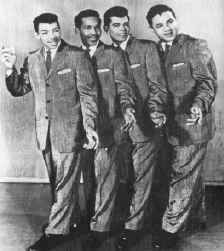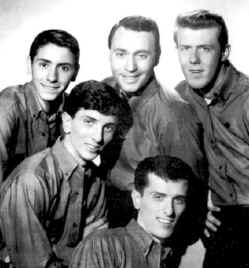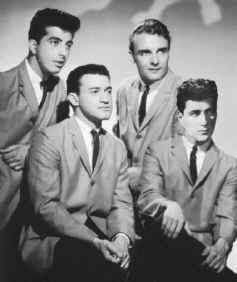
One of Brooklyn's white doo wop groups, the Passions helped further the career of two top writers/artist
Passions

One of Brooklyn's white doo wop groups, the Passions helped
further the career of two top writers/artist
Member:
Jimmy Gallagher - lead
Tony Armato - first tenor
Albee Galione - second tenor
Lou Rotondo - baritone / lead replaced by
Vinnie Acierno 1960
Artist Biography by Ron Wynn
An above-average white doo wop ensemble from Brooklyn, the
Passions' abilities often exceeded the quality of their material.
They began as the Sinceres, then changed their name to the
Passions when they began recording in the late '50s. Lead
vocalist Jimmy Gallagher, Tony Armato, Albie Gallone, and Vinnie
Acierno comprised the group. They never managed either an R&B
or pop hit, despite doing sessions for Audicon, Diamond, Jubilee,
and Octavia. Their debut for Audicon, "Just to Be With
You," made significant impact, but they couldn't sustain the
momentum. Another beloved Passions number is "Gloria."
Pastels

L to R: Tony Thomas, J.B. Willingham,
Richard Travis, Dee Irwin
One of the few American vocal groups to form outside the
continental U.S., the Pastels came together in Narasarssuak,
Greenland
Members:
Dee Irwin - lead
J.D. Willingham - baritone
Tony Thomas - second tenor
Richard Travis - first tenor
Artist Biography by Jason Ankeny
Doo wop group the Pastels formed in 1954. At the time, lead
DiFosco "Dee" Erwin, first tenor Richard Travis, second
tenor Tony Thomas, and baritone Jimmy Willingham were all
stationed at a U.S. Air Force base in Narsarssuak, Greenland, and
their first live appearances were in conjunction with military
showcases. According to Marv Goldberg's profile in the December
1977 edition of Yesterday's Memories, all four Pastels were
eventually transferred to Washington, D.C., and following a
well-received performance at the USAF's annual "Tops in
Blue" talent show, the group decided to pursue a record
contract, eventually landing with the small Hull label. Their
debut, "Been So Long," hit retail in November 1957, and
when it seemed poised for breakout success, Chess Records
licensed the disc for national distribution, reissuing the single
on its Argo subsidiary a month later. In early 1958, "Been
So Long" reached the R&B Top Five, also crossing over to
number 24 on the Billboard pop chart. After extensive touring as
part of DJ Alan Freed's Big Beat Show, the Pastels returned to
the studio to cut a follow-up, "You Don't Love Me
Anymore." The record failed to match the success of its
predecessor, however, and when their third Argo release, "So
Far Away," met the same fate, the group dissolved in early
1959. Dee Ervin returned to his native New York City and mounted
a solo career, scoring a 1963 hit with his cover of the World War
II-era favorite "Swinging on a Star."
Randy
and the Rainbows

One of the last pop doo wop groups to make the Top 10 before
the Beatles invaded America
Members:
Dominick "Randy" Safuto - lead
Frank Safuto - first tenor
Sal Zero - second tenor
Mike Zero - baritone
Ken Arcipowski - bass
One of the last pop doo wop groups to hit the top
10 before the Beatles barnstormed American radio (acutely Dion
& the Del -Satins were the last. reaching number six with
"Drip Drop" on December 28, 1963), Randy & the
Rainbows were a Maspeth, Queens, quintet with hopes of lasting
success that were dashed by the death of a president and foreign
"invasion". In 1959, 12-year-olds Dominick Safuto, his
brother Frank, cousin Eddie Scalla, and Rosalie Calindo on Lead
formed the Dialtones.
They managed one obscure single, "Till i heard it from
you", for George Goldner's Goldisc Label in 1960. The
Hilight of that session might have been the period the Dialtones
spent sitting in the studio waiting room with idols Little
Anthony & the Imperials awaiting their turn to record. In
1961 Goldisc tried again, releasing the Dialtones single for
another shot at the charts. It didn't work. Dom (Lead) then
joined up with friend Mike Zero (Baritone) to form a new group
with Mike's brother Sal (Second Tenor) and Ken Arcipowski (Bass)
as the Encores. When the Grover Cleveland High School Quartet
decided to fill out their sound as a quintet, Dom convinced his
brother and ex-Dialtone member Frank (First Tenor) to Join, and
they renamed themselves Junior & the Counts.
The Counts started Playing church festivities, sweet sixteens,
and the like until they came to the attention of frank Carrarie,
who became their manager and introduced them to songwriter Neil
Levenson. Neil brought them to bright tunes productions, which
was really the creative base of singing-group-turned-producers
the Tokens.
The Tokens produced the Group on two songs written by Levinson
titled "Denise" and "Come Back", but before
they could issue them on Rust subsidiary Laurie Records, a more
commercially acceptable group name had to be chosen. The Schwartz
Brothers, owners of Laurie, renamed them Randy & the
Rainbows.
Dom became Randy and "Denise" became a monster hit. By
August 24th it was number 10 nationally. with its gust-of-wind
styled "oohs" on the into, a Four Seasons type of
arrangement, and Randy's attractive lead, "Denise"
crossed over the R&B chart on September 14th and peaked at
number 18. It reached as high number two on New-York's local
Radio Charts.
A cross country tour grew out of "Denise's" success,
and the five 16 years olds were living in fantasyland performing
alongside Dionne Warwick, the Chiffons, Timi Yuro, Darlene Love
and the Four Seasons. They also did Murray the K's Brooklyn Fox
Labor Day show for 10 days and were in awe of the talent around
them, including Ben E. King, The Ronettes, The Miracles, The
Dovells, The Chiffons, The Tymes, Little Stevie Wonder, The
Angels (Whose "my boyfriend's back" beat them out of
the top spot in New York), The Shirelles, Jan & Dean, Gene
Pitney, and for one day only (as the poster said), The Beach
Boys.
The Rainbows' next release, "Why do kids grow up", was
a similarly infectious doo wop rocker that was released in the
fall of 1963. It stopped, along with the country's heartbeat,
when one week later President John F. Kennedy was assassinated.
The record was affected (as countless others); due to lack of
interest during the country's turmoil, it barely charted
nationally (#97, December 14, 1963).
From there on Rust singles like "Dry your Eyes",
"Little Star" (The Elegants song), and
"JoyRide" had little support and not much of a chance
when the British invasion hit America.
The group continued to perform, but mostly on New York area
one-nighters. They appeared on Jerry Blavat's Philadelphia TV
show as well as on Clay Cole's New York TVer.
Dominick "Randy" Saluto died October
16, 2018 at 71.
Sal Zero died November 19, 2019 at 77.
Ken Arcipowski died March 23, 2011 at 66.
Rays

To L to R: Dewey Jones, Harry James, Walt
Ford
Bottom: Hal Miller
The Rays were probably the music business's most fortunate
beneficiaries of the effects of subliminal message.
Members:
Harold "Hal" Miller
- lead
Walter Ford -first tenor
Davey Jones - second tenor
Harry James - baritone
This R&B group consisted of Harold Miller (b. 17 January 1931), tenor Walter Ford (b. 5 September 1931), second tenor Davey Jones (b. 1931) and baritone Harry James (b. 1932). It was formed in New York in 1955, when two refugees from the Four Fellows (of ‘Soldier Boy’ fame), Miller and Jones, teamed up with James and Ford. They first recorded for Chess with no success, then moved to the Philadelphia-based Cameo label in 1957 and achieved lasting fame, albeit as one-hit-wonders, with ‘Silhouettes.’ The song went to number 3 both R&B and pop in late 1957. The flip-side, the rousing jump led by Ford, ‘Daddy Cool’, received solid play and briefly charted. These songs are much better known than the Rays, having been remade innumerable times. Herman’s Hermits in 1965 and Cliff Richard in 1990 both took ‘Silhouettes’ up the charts, while British revivalist band Darts, in 1977, and Boney M in 1976, each took ‘Daddy Cool’ into the UK Top 10.
Harold Miller died. October, 2021.
David Jones died 1995.
Regents

(L-R) Guy Valari, Sal Cuomo, Charles Fassert, Ernie Marasca
An Italian doo wop group from the Bronx, the Regents began in
1958 as the Montereys
Members:
Guy Villari - lead
Sal Cuomo - first tenor
Charles Fassert - second tenor
Ernie Maresca - baritone replaced by Don
Jacobucci
Tony Gravagna - bass
Artist Biography by Andrew Hamilton
Guy Villari (lead), Sal Cuomo (first tenor), Ernie Maresca
(baritone), and Chuck Fassert (second tenor) formed in the Bronx,
NY, in 1958 as the Montereys. Signing with Seville Records, they
cut two Maresca songs that went unreleased, and soon Donnie
Jacobucci replaced a disappointed Maresca. They recorded their
demonstration records at the Regents Sound Studios, prompting a
name change to the Regents, but their first release didn't happen
until 1961, three years after they
started.
"Barbara Ann" was recorded in 1958, but more than 50
recording companies said "no," causing them to disband
before 1959 rolled around. Jacobucci's younger brother Eddie
revived the Regents by accident. His group, the Consorts, lacked
original songs for an audition so they cut a version of
"Barbara Ann" from an old demo Eddie found around the
house. When the owner of Cousins Records heard the song, he
decided to put it out, not by the Consorts, but by the Regents.
With Eddie replacing Guy, the original group reunited, and
Cousins released "Barbara Ann" in March of 1961. The
stuttering doo wop became a number one record in New York; the
demand was overwhelming and Cousins leased it to Roulette/Gee for
worldwide distribution and saw it soared to number 13 pop and
number seven R&B.
A second single, "Runaround," charted at number 28 pop
and number 30 R&B; a third single, "Liar," didn't
chart, and neither did a fourth,"Oh Baby." They
disbanded but emerged in 1964 as the Runarounds, waxing and
releasing five singles on as many labels. The Runarounds were
Villari, Fassert, Ronnie Lapinsky, and Sal Corrente; their first
single, "Unbelievable," on Nat King Cole's short-lived
KC label in 1963 didn't sell nor did their last, "You
Lied," on MGM in 1967. Again they separated but reunited as
the Regents in 1973 to play the oldie circuit. A copy of
"Barbara Ann" on the Cousin label fetches around 1,200
dollars; the same recording on Gee sells for 25 dollars or less.
Gay Villari died September 21, 2017, he was 75.
Sal Cuomo died 2013.
![]()